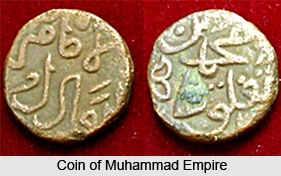 Muhammad Bin Tughlaq was an ambitious ruler and adopted several innovations in domestic affairs. Different measures were taken in the field of administration such as revenue reforms, taxation in Doab, improvement of agriculture, transfer of the capital and the introduction of token currency. Though these policies were attempted with best intentions but it adversely affected the fortune of the empire.
Muhammad Bin Tughlaq was an ambitious ruler and adopted several innovations in domestic affairs. Different measures were taken in the field of administration such as revenue reforms, taxation in Doab, improvement of agriculture, transfer of the capital and the introduction of token currency. Though these policies were attempted with best intentions but it adversely affected the fortune of the empire.
Muhammad Tughlaq carried out many measures for the improvement of the administration of revenue. One of these measures was preparation of a register in which income and expenditure of all the princes were recorded. The main motive of the Sultan was to introduce a uniform standard of land revenue all through his empire and to see that no village remained unassessed. However, nothing is known about the advantages of this system. In the beginning of his reign, the Sultan increased taxation in the Doab. According to Barani, the taxation was raised by ten to twenty times more. Taxes were increased and at a time when there had been a famine in the Doab owing to the failure of rains. Therefore, the peasants, instead of paying the taxes, abandoned their lands and adopted highway robbery. The tax collectors continued to collect taxes by tyranny which resulted in widespread revolts. This policy of the Sultan proved to be a perfect failure. Even the usual revenue could not be collected from the Doab. Besides, the Sultan became unpopular among his subjects.
Muhammad Bin Tughlaq established a separate department of agriculture and appointed a minister Amir-i-kohi, to look after it. The main purpose of this department was to increase the land under cultivation. Nearly, seventy lakh rupees, was spent by the government in three years yet the experiment failed and the scheme was abandoned after three years. The corruption of the officer, poor quality of land chosen for farming and indifference of cultivators who were assigned land under government supervision were responsible for the failure of the scheme.
Muhammad Tughlaq`s attempt to transfer the capital from Delhi to Daultabad was another futile measures adopted by him. Several reasons can be citied for him to take this step. The empire of the Sultan had extended far and wide within the territories of India and Daultabad was in fee centre and more strategically placed as compared to Delhi. The administration and consolidation of south India required more attention as compared to the north, the desire to keep the capital a safe distance from invasions of the Mongols or, on the contrary, be absence of danger from invasions of the Mongols, the temptation of wealth of the south, and, probably, the desire of the Sultan to spread Muslim culture in the south were different reasons of the Sultan to transfer the capital to Daultabad. The common masses were neither prepared to shift themselves to a distant place nor was there any necessity of it. This scheme of the Sultan failed completely.
Various types of coins were introduced by Muhammad Bin Tughlaq during his reign. The note worthy feature of the coinage system was the introduction of token currency and issue of copper and brass coins. The Sultan made these token coins legal tenders and kept their value at par with gold and silver coins. Previously, the copper coin was Jital (Paisa). Now, the Sultan issued Tanka (rupee), a silver coin, also that of copper. This scheme of the Sultan also failed miserably. Many historians blamed the Sultan for the failure of the scheme. According to them it was a blunder on the part of the Sultan that he did not take proper precaution to check imitation of coins issued by royal mints. Those coins, therefore, could be imitated by moderately skilled artisans. Therefore, the citizens began to mint token coins in their houses. In fact, both the Sultan and his subjects were responsible for the failure of this scheme.
Thus Muhammad Bin Tughlaq failed to carry any of the schemes to success. It can be said in favour of the sultan that his measures were ahead of his time; his subjects and officials failed to understand worth of his schemes and, therefore, did not cooperate with him to bring them to success. The Sultan himself was also responsible for the failure of his schemes to a large extent. The Sultan possessed an artistic mind but lacked practical wisdom. He, therefore, could formulate new schemes which, probably, were sound in principles but he failed to devise practical measures to bring them to success. The Sultan lacked patience also. He desired quick success; even minor failure enraged him and when desired results could not be achieved speedily, he abandoned his scheme in haste. All these weaknesses participated in failure of his domestic policies.






































